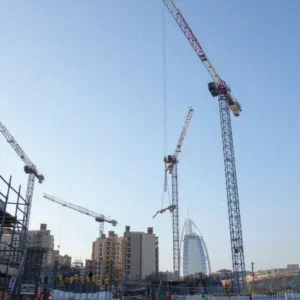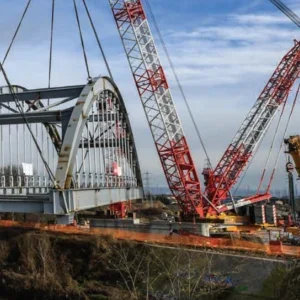Since the 1979 Hydrocarbon Oils Duty Act, mobile cranes are excepted from most of the duty on fuel, along with some types of farm, road and construction plant. Mobile cranes are excepted provided they do not carry loads and use public roads infrequently, or incidentally to their main work. Since they hardly use the road network, the thinking went, they should not have to pay road maintenance costs.
Mobile cranes and these other types of machinery have only had to pay £0.05/L, or about $0.11/gallon of duty, which is one-eighth of the standard road-going rate, £0.47/L, or $0.95/gallon. Standard UK sales tax of 17.5% is added on top of that, but can be claimed back by registered companies.
The rebated diesel fuel is called gas oil, and because of the pinkish dye added to help track its use, it is known as red diesel. Today’s full-price alternative, ultra-low sulphur diesel, is the same fuel that consumers buy at the pump in filling stations.
In the paper, the Government says: ‘By their very nature, mobile cranes are road going for a large part of their life, and this is reflected in the requirement on operators to have a Large Goods Vehicle driver’s licence. It is only the largest mobile cranes whose use of roads can be said to be infrequent; and even then the very largest are dismantled and moved by low loader. The vehicles used to transport the dismantled crane are road vehicles and would correctly use road fuel.’
It asks whether there is a continued need for a mobile crane category of excepted vehicle, and if so how entitlement to rebated gas oil might be limited to vehicles that ‘genuinely make incidental use of roads.’
UK crane industry trade body the Construction Plant-Hire Association is
co-ordinating a response to the consultation from its members.
Chief executive Colin Wood says: ‘The consultation is taking it as given that mobile cranes are on the road all the time. Where did they get that from?
‘When it was first brought in, cranes were only incidentally used on the road. In the industry since then, of course, there have been changes, but cranes are no more on the road than they were – the ratio of site time to road time has not changed,’ Wood says.
‘The massive cost impact it will have on the industry will have to be recovered – the industry can’t absorb that kind of cost. Rates will have to be seriously adjusted.’
Martin Ainscough, managing director of the UK’s largest crane hire company Ainscough Crane Hire, adds: ‘We don’t think it’s fair. A crane is a special vehicle.’ He estimates that the change would increase the cost to run his 530-crane fleet by more than £3m per year, or £5,600 per crane. He warns that it will put up construction costs dramatically, costs that customers will not accept.
Says Geoffrey Marsh, director of crane rental company Marsh Plant: ‘I’m going to take a hard line. This Government is only out to screw us out of money. The moment you change the economics of the business, you potentially erode profitability.’
Alec Glover of crane hire company Terranova, and spokesman for the National Crane Group, an alliance of seven regional UK crane hirers, worries about safeguarding fuel in depots. ‘We may need armed guards to protect our fuel,’ he says.
A dissenting voice comes from Tim Sparrow, director of Sparrow Crane Hire.
‘I personally see no problem in the introduction of white diesel,’ he says.
‘All costs would ultimately have to be passed onto the end user, who is probably the only beneficiary of red diesel.’
The Government’s consultation period with industry is scheduled to finish 2 March. According to the consultation document, the earliest opportunity for new laws would be the 2005 Finance Bill. If the Finance Bill included laws that allowed Customs and Excise, the Government department tasked with regulating the fuel industry, to change the list of excepted vehicles, it would offer industry another consultation to discuss these final changes before the proposal becomes law.






